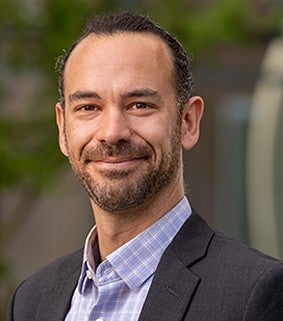

A biomedical engineer whose research has the potential to improve the lives of everyone from combat soldiers to athletes to arthritis patients has brought his expertise in tissue engineering and regenerative medicine therapies for musculoskeletal injury and disease to the University of Oregon’s Phil and Penny Knight Campus for Accelerating Scientific Impact.
Nick Willett joined the Knight Campus as an associate professor and the associate director of the UO’s Regenerative Rehabilitation initiative — one of six scientific “moonshots” advancing human well-being through the study of peak performance as part of the recently announced Wu Tsai Human Performance Alliance.
Using combinations of stem cells and biomaterials, the Willett Lab is developing novel technologies and therapies to create new tissues and regrow and repair different musculoskeletal tissues after loss, either due to disease, trauma or age. The research team works primarily with bone, muscle and cartilage in the hopes of treating ailments ranging from degenerative diseases to sports injuries like meniscal and tendon tears to traumatic injuries such as blast wounds or injuries due to car accidents. One major focus is arthritis, which affects an estimated 23% of all adults in the U.S. — over 54 million people.
“I like to sit at the interface between engineering and clinical practice and to collaborate with people on either side to help bridge engineering (and medical) technologies,” Willett said.
An athlete and outdoor lover who has confronted his own injuries Willett has seen the derailing effect of sports injuries. Additionally, his family has a history of adult-onset muscular dystrophy, which in the case of his father, went undiagnosed for decades and led to chronic pain and multiple surgeries. The only treatment for the condition is pain management and physical therapy, but gene therapies like CRISPR technologies hold promise and Willett is paying close attention to their use in musculoskeletal disease.
In practice, Willett’s research is highly iterative and covers a wide spectrum. It includes cell and tissue culture models--derived from both adult cells and stem cells — known as “performance organoids” that can help replicate high-performing tissues. He also works with clinicians to collect patient specimens to do analyses to better inform their results.
Willett’s team at the Knight Campus will work to adopt a highly integrated approach to research. By examining musculoskeletal conditions as part of a system rather than as independent tissues, his team seeks to advance the field and address some of its limitations.
“Dr. Willett’s pioneering work in the field of regenerative rehabilitation uniquely addresses the challenges of musculoskeletal disease and regeneration,” said Robert Guldberg, vice president and Robert and Leona DeArmond Executive Director of the Knight Campus. “His high-impact research supports the Knight Campus mission by translating regenerative therapies into new functional tissues and bringing those therapies into clinical practice to improve patient care and human health.”
Prior to joining the Knight Campus Willett served as an associate professor at Emory University. He received his PhD in 2010 in biomedical engineering from Georgia Tech and Emory University and performed postdoctoral training at Georgia Tech in mechanical engineering.
In addition to advancing the mission of the Knight Campus by bringing knowledge out of the lab and into the world, he looks forward to another form of scientific impact.
“The other impact is educating that next generation of biomedical engineers and life science trainees so that they can go out and create better solutions to all of the challenges that are facing us as a society,” Willett said.
